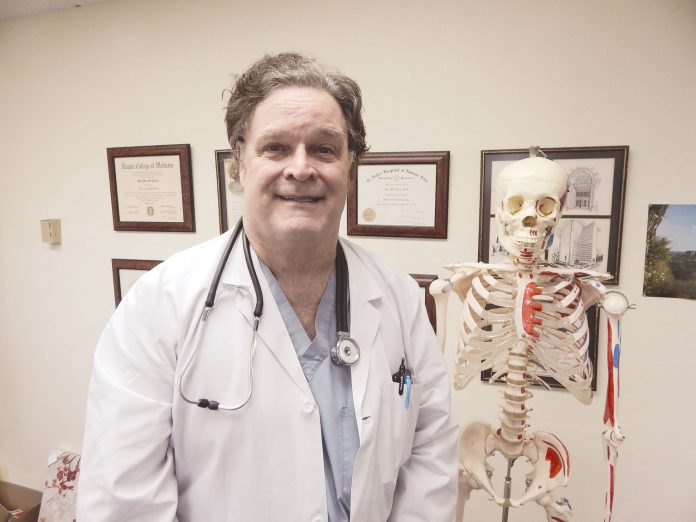
Mid America Stem Cell Institute plans presentation
by James Coburn – Writer/Photographer
Dr. John Nelson wants to alleviate any fears about stem cell research. He and his partners at the Mid America Stem Cell Institute plan a presentation on April 5th at the Summit Medical Center located at 1800 Renaissance Blvd. in Edmond.
The public is invited to become more educated about what stem cells are and how they can be used in treating a variety of degenerative conditions from back pain, to knee pain and chronic lung disease, diabetes, some neurological disorders, he said.
“Even though it’s not FDA approved we think it’s very safe because basically we are using the patients’ own stem cells from their body fat,” Nelson said.
The stem cells his clinic use have nothing to do with abortion embryonic stem cells, he said. His partner, Dr. Doug Beall, is currently involved in a three-year study of injecting stem cells into discs of people with back pain. He is also involved in another study of injecting stem cells with a source from Miami.
Mid America Stem Cell Institute collaborates with other biomedical research groups across the county. The more data they can accumulate serves to benefit humanity. More than 500,000 stem cell procedures have occurred worldwide in the last 20-30 years.
“We think with good patient selection there are a lot of conditions that can benefit from this,” Nelson said. “I myself was a patient.”
It is personally enriching from Nelson to be able to share stem cell research to enlighten and engage people regarding health care opportunities. He said the potential of collaborative research is not completely known.
“The science is still evolving in terms of how do we select a sub population of stem cells that are going to be more specific to conditions,” Nelson said. “For example, someone with a torn cartilage in their knee where it’s bone on bone — if you can regenerate some of their cartilage to avoid the need for surgery, that’s an advantage.”
It comes down to what kind of cartilage you are regenerating because there’s different types, he said. Preferentially you would like to regenerate the type of cartilage that was already there.
Research is focusing on determining genetic and stem cell markers to use in certain conditions. Investigators are learning to separate them from all the stem cells they harvest. There is also interest investigating if the stem cells are doing what needs to be done or are they acting as a messenger to attract other cells and other stem cells to come the sites of injury or inflammation.
“As a patient myself who had a bad pulmonary problem,” he said.
Nelson does not smoke and nobody could figure out what was wrong in spite of a lung biopsy.
“After five days when I received IV stem cells, the cough and symptoms completely resolved,” he said. “And eight months later I repeated the CT-scan and all the nodules were gone. So I personally have seen the benefits of this in my own health.”
Nelson had been on the verge of having to quit his practice. He literally was coughing every minute of the hour, day and night, for two years. He was physically exhausted and had given up on lecturing locally and overseas due to coughing.
“So it changed everything for me,” he said. “And when I tore my meniscus in my knee last fall, I injected stem cells in my knee and eight weeks later, my pain was gone and I didn’t have to have surgery.”
Now the institute is working with a company that has stem cells from healthy cord blood from healthy newborn babies, he said.
“It may have some specific advantages as well in terms of the potency of stem cells,” Nelson explained. “So everything is evolving.”
Nelson attended an annual meeting in February and said he is sure if he goes to the meeting next year there will be all kinds of new information.
“It’s an exciting time to be involved in this,” he said.
As a medical doctor, Nelson said his ability to help other people is a humbling experience. He and Dr. Beall have seen some patients have almost miraculous responses to treatment.
“I can recall a patient with lupus who had 80 percent remission,” Nelson said. “A patient with Parkinson’s disease had a 60 percent improvement.”
But the research remains on a learning curve. Collaborative research is serving the betterment of mankind. A world-wide community is engaged in this.
“Europeans and people outside the country probably are ahead of us because they haven’t had all the FDA sanctions. But we think that is hopefully going to change, too.”












